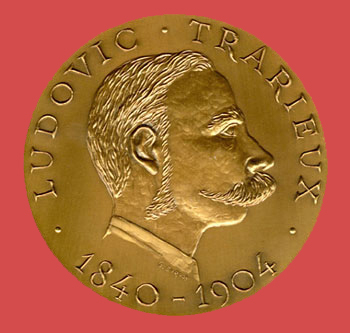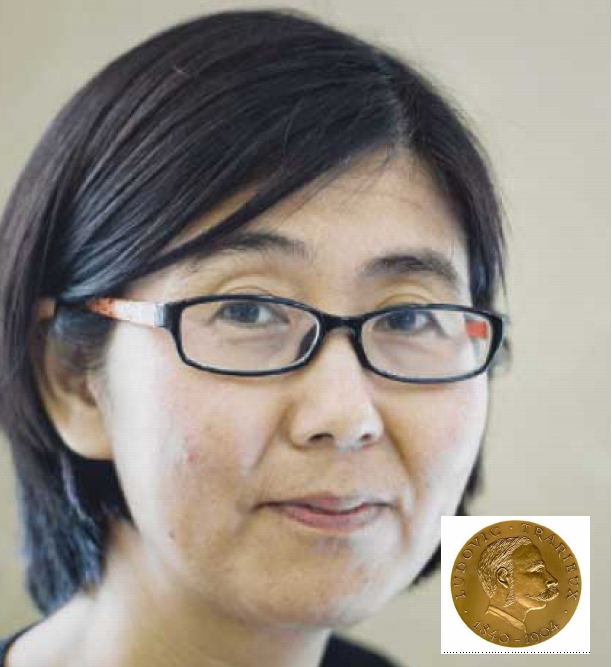
维权律师 获颁国际人权奖
Ludovic-Trarieux
International-Human Rights Prize 2016
Prix
International des Droits de l'Homme Ludovic-Trarieux
2016
Premio Internacional de Derechos Humanos Ludovic Trarieux 2016
Premio Internazionale
per i Diritti Umani Ludovic
Trarieux 2016
Internationalen Ludovic-Trarieux-Menschenrechtspreis 2016
Prêmio Internacional de Direitos Humanos Ludovic Trarieux 2016
Ludovic Trarieux
Internationale Mensenrechtenprijs 2016
Depuis/Since/Desde/Dal/Sinds 1984
“El homenaje de abogados
a un abogado ”
“L’hommage des avocats à un avocat ”
“The award given by
lawyers to a lawyer”
“L'omaggio degli avvocati ad un avvocato”
“Die Hommage von
Anwälten zu einem Anwalt”
« De award
gegeven door advocaten aan een
advocaat »
THE
LUDOVIC-TRARIEUX PRIZE 1985 (PDF)
维权律师 获颁国际人权奖

王宇
中国知名维权女律师王宇获颁特拉里奥国际人权奖,而去年"709"大抓捕事件中被拘留的王宇仍在拘禁中。
(德国之声中文网)特拉里奥国际人权奖(Ludovic Trarieux Human Rights Prize )的评审周六(6月4日)介绍王宇的获奖理由:想要赞赏王宇身为女性不畏危险、敢于发声的精神,她宁愿让自己陷入险境,也要勇敢捍卫女性、儿童和受迫害的少数民族权益。
北京锋锐律师事务所律师王宇于今年1月被当局以"涉嫌颠覆国家政权"罪名批捕。同时和她一起被批捕的还有其他至少4名律师。去年7月9日,王宇受到拘留,并于隔月被指控"煽动颠覆国家政权"。迄今,"709"大抓捕事件中多数重要人士已经被批捕。
王宇曾代理曹顺利案、维吾尔学者伊力哈木案,以及为法轮功学员辩护。她所任职的北京锋锐律师事务所则经常受理高度敏感的维权官司,例如德国《时代周报》记者科克里茨(Angela Köckritz)中国助手张淼一案。
王宇的代理律师李昱函一月表示:"王宇向社会最底层的人士提供法律服务。我从未想过她会被控颠覆国家政权罪。我实在无法理解。"李昱函还指出,自王宇去年7月被拘留后,她便不曾见过当事人。据李昱函称,警方在过去6个月内7次拒绝让她会见王宇,原因是王宇一案"危及国家安全"。
特拉里奥国际人权奖在过去30年里已颁发过20次。该人权奖以19世纪法国多维克‧特拉里奥的名字命名。这名律师是法国犹太裔军官阿尔弗雷德·德雷福斯(Alfred
DreyfuS)的忠实捍卫者。德雷福斯曾被误判为叛国。
使用我们的App,阅读文章更方便!给yingyong@dingyue.info发送一封空白电子邮件就能得到软件和相关信息!
Wang Yu, 45,
from Ulanhot, Inner Mongolia, has becomed
the “Emblem of China’s Human Rights Crackdown”. As a Chinese human rights
lawyer, she is sadly known for being the first victim to be detained in the
“709 Crackdown”, one of the harshest actions against the legal profession in
China.
Wang Yu began
to practice as a lawyer in Beijing in May 2004, mainly working on commercial
cases. Following the Tianjin railway incident on May 4, 2008, she got into an
argument with rail employees when she was denied entry onto a train even though
she had a ticket. Several unidentified men assaulted Wang Yu. She filed a
complaint with the local police, but seven months later, she was charged with
“intentional assault”. The police officer revenged and on December 9, 2008,
instead of receiving a response to her complaint, Wang Yu was arrested.On November 24, 2010, after a questionable legal
process, she was sentenced on appeal to 2 years and six months in prison by the
Beijing Railway Transportation Court. While in prison, Wang Yu became aware of
widespread torture and mistreatment of prisoners. Her lawyer’s license was also
suspended afterwards and she was allowed to practice again in late 2012. She
decided “to improve China's human rights system through the legal system and
push for the rule of law."
Between 2011
and 2015, she actively worked as a human rights lawyer, undertaking challenging
legal cases involving clients who other lawyers feared to represent. Wang Yu
represented numerous victims of human rights violations, in particular, members
of vulnerable groups such as women, children, migrant workers, disabled people,
and ethnic and religious minorities. She also represented human rights
defenders and political dissidents. Among them:
- Liu Ming, a visually impaired person, in
a case known as the “Beijing First Case Regarding Discrimination against
Disability in Employment” (Beijing, 2013-2014);
- Falun Gong practitioners charged with
“Sabotaging Legal Enforcement by Using Heretical Religion”. Defense of these
every sensitive and politically charged cases certainly increased the risk that
Wang Yu herself would be subject to police retaliation. On 22 April 2015, as
she was representing Falun Gong member in Shenhe
District Court, Wang Yu was violently dragged out of court after she protested
to the judge because her female client was beaten.
- Ilham Tohti, a
Uyghur activist and economist sentenced to life imprisonment on
separatism-related charges (Xinjiang, 2014);
- Cao Shunli, a
woman human rights activist, who after being abducted at the airport, was
charged with “creating disturbance” and who eventually died in custody in 2014,
reportedly following a lack of adequate medical treatment (Beijing, 2013-2014);
- The “Five Feminists” who were charged in
March 2015 with “picking quarrels and provoking troubles” as they planned a
public awareness campaign against sexual harassment to coincide with
International Women’s Day (Beijing, 2015).
- Fan Mugen, an
eviction protester, who was found guilty of “intentional injury” and sentenced
to 8 years of imprisonment after he attacked members of a demolition gang who
came to raze his home and who assaulted his family (Jiangsu, 2013-2015);
- Wu Gan, a
prominent cyber activist who worked for Wang’s law firm, the Beijing Fengrui Law Firm, charged with “picking quarrels and
provoking trouble” and “inciting subversion of state power” after he supported
harassed lawyers working on a death penalty case involving defendants who had
been tortured to confess.
Wang Yu
cosigned statements and participated inactions urging increased protection for
human rights; supporting lawyers and activists arbitrarily sanctioned, harassed
or prosecute’requesting abolition of re-education
through labor; and denouncing death penalty convictions. Moreover, Wang Yu also
submitted legislative suggestions and petitions, co-signed open letters and
participated in public discussions on many human rights issues, including
discrimination against gender, children’s rights and protection of human rights
lawyers.
Because of her
human rights activities, Wang Yu had been consistently harassed, threatened,
assaulted by the police, and smeared in the state-run media. On June 2015, her imprisonment
in 2008 became the basis for a smear campaign in Xinhua, when a published
article portrayed Wang Yu as a violent and deceitful lawyer who had refused to
pay the financial penalty for her actions.
On July 9,
2015, early in the morning, the electricity and Internet were shut off at Wang
Yu’s home, the front door was pried open, and she was taken away. She had just
sent a text message to friends saying that her internet and electricity had
been cut off and that people were trying to break into her home. She remained
missing for a few days before her relatives knew she had effectively been
arrested. The same day Bao Longjun,
her husband and a trainee lawyer, and Bao Zhuoxuan, their 16-year-old son, were taken into custody at
Beijing Capital Airport. Their son was handed over to his aunt and his passport
was confiscated. He then went to two of his parents’friends
with the intention to go to the United States via Thailand, but he was
apprehended in Burma. He was heavily interrogated, and threatened. Today, the
teenager is under house arrest at his grandparents’home
in Mongolia. The neighbours’homes had been adopted
for the 24-hour monitoring.
Soon after
Wang’s arrest, law firm staff and their relatives have been detained, arrested,
held incommunicado, summoned, forbidden from leaving the country or otherwise
have had their freedom temporarily restricted. Many of them worked at Wang’s
law firm. The head of the firm, Zhou Shifeng, was
among those targeted. Since her arrest, Wang Yu has been the focus of a
ferocious attack in state media. An official newspaper of the Chinese Communist
Party, The People’s Daily, accused the Fengrui Law
Firm of being a criminal gang and part of a criminal operation to ‘undermine
social stability’.
Wang Yu and her
husband were placed under “residential surveillance in a designated location”.
Chinese regulations allow for secret detention in an undisclosed location for a
period of up to six months. On January 9, 2015 at the end of the six-month
period, Wang Yu, was formally charged with “subversion against the State”, and
risks a maximum sentence of life imprisonment or not less than 10 years of
fixed-term imprisonment. Her husband, Bao Longjun, was accused of incitation for the same crime. She
is currently imprisoned at Tianjin No. 1 Detention Center.
MEMBRES DU JURY
2016
(par ordre alphabétique)
Dominique Attias
Brigitte Azéma-Peyret
Isabelle Bühler Galladé
Zbigniew Cichon
Maxime Delhomme
Nicole Derhy
Carlos Fatàs Mosquera
Bertrand Favreau
Julie Goffin
Marie-France Guet
Bernd Haüsler
Christina Kountouri
Charilaos Ladis
Anton Giulio
Lana
Fanny Margairaz
Mario Melillo
Christophe Pettiti
Agaath S. Reijnders-Sluis
Sophia Spilotopoulos
Adrie van de Streek
Haris Tagaras
Jean-Jacques Uettwiller
“The
tribute given by lawyers to a lawyer”
Created in 1984, the "International
Human Rights Prize Ludovic -Trarieux” is awarded to
" a lawyer, regardless of nationality or Bar, who thoroughout
his career has illustrated, by his activity or his suffering, the defence of human rights, the promotion of defence rights, the supremacy of law, and the struggle
against racism and intolerance in any form ".
It is the oldest and most prestigious
award given to a lawyer in the world, commemorating the memory of the French
lawyer, Ludovic Trarieux (1840-1904), who in the
midst of the Dreyfus Affair, in France, in 1898, founded the " League for
the Defence of Human Rights and the Citizen ",
because, he said: " It was not only the single cause of a man which was to
be defended, but behind this cause, law, justice, humanity ".
The first Prize was awarded on March
29th, 1985 to Nelson Mandela then in jail. It was officially presented to his
daughter, Zenani Mandela Dlamini,
on April 27th 1985, in front of forty presidents of Bars and Law Societies from
Europe and Africa. It was the first award given to Mandela in France and the
first around the world given by lawyers. On February 11th 1990, Nelson Mandela
was released. Since then, it was decided that the Prize would be awarded again.
Since 2003, the Prize is awarded every
year in partnership by the Human Rights Institute of The Bar of Bordeaux, the
Human Rights Institute of the Bar of Paris, the Human Rights Institute of The
Bar of Brussels, l'Unione forense
per la tutela dei diritti dell'uomo (Roma), Rechtsanwaltskammer Berlin, the Bar of Luxemburg, the Bar
of Geneva, the Bar of Amsterdam as well as the Union Internationale
des Avocats (UIA), and the European Bar Human Rights Institute (IDHAE) whose
members are the biggest european law societies
fighting for human rights. It is presented every year in a city that is home to
one of the member Institutes.
1985: Nelson MANDELA (South Africa)
1992: Augusto ZÚÑIGA PAZ (Peru) †
1994: Jadranka
CIGELJ (Bosnia-Herzegovina)
1996 Nejib HOSNI (Tunisia) and Dalila MEZIANE
(Algeria).
1998 ZHOU Guoqiang
(China)
2000 Esber
YAGMURDERELI (Turkey)
2002 Mehrangiz KAR (Iran)
2003 Digna OCHOA and Bárbara ZAMORA (Mexico)
2004: Akhtam NAISSE (Syria)
2005: Henri BURIN DES ROZIERS (Brazil)
2006: Parvez IMROZ (India)
2007 : René GÓMEZ MANZANO (Cuba)
2008 : U AYE MYINT (Burma)
2009 : Beatrice MTETWA (Zimbabwe)
2010 : Karinna
MOSKALENKO (Russia)
2011 : Fethi TERBIL
(Libya)
2012 : Muharrem
ERBEY (Turkey)
2013 : Vadim KURAMSHIN (Kazakhstan)
2014 : Mahienour el-MASSRY
(Egypt)
2015 : Waleed Abu al-KHAIR (Saudi Arabia)